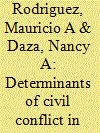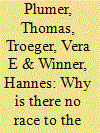|
|
|
Sort Order |
|
|
|
Items / Page
|
|
|
|
|
|
|
| Srl | Item |
| 1 |
ID:
175315


|
|
|
|
|
| Summary/Abstract |
We apply the information gap approach to resource allocation under Knightian (non-probabilistic) uncertainty in order to study how best to allocate public resources between competing defence measures. We demonstrate that when determining the level and composition of defence spending in an environment of extreme uncertainty vis-a-vis the likelihood of armed conflict and its outcomes, robust-satisficing-expected utility will usually be preferable to expected utility maximisation. Moreover, our analysis suggests that in environments with unreliable information about threats to national security and their consequences, a desire for robustness to model misspecification in the decision-making process will imply greater expenditure on certain types of defence measures at the expense of others. Our results also provide a positivist explanation of how governments seem to allocate security expenditures in practice.
|
|
|
|
|
|
|
|
|
|
|
|
|
|
|
|
| 2 |
ID:
110182


|
|
|
|
|
| Publication |
2012.
|
| Summary/Abstract |
We analyze how the determinants of the civil conflict in Colombia at the municipal level respond to changes in the empirical strategy. We estimate several econometric models that vary in three dimensions: 1) the data set, 2) the measure of conflict, and 3) the estimation method. We find substantial differences in the signs and statistical significance of the marginal effects in response to using a different data set, changing the definition of conflict, and employing different empirical methodologies.
|
|
|
|
|
|
|
|
|
|
|
|
|
|
|
|
| 3 |
ID:
087450


|
|
|
|
|
| Publication |
2009.
|
| Summary/Abstract |
Studies of nuclear proliferation share five serious problems. First, nuclear programs' initiation and completion dates are ambiguous and difficult to code, but findings are rarely subjected to sufficient robustness tests using alternative codings. Second, independent variables overlook important factors such as prestige and bureaucratic power and often use poor proxies for concepts such as the nonproliferation regime. Third, methodologies and data sets should be tightly coupled to empirical questions but are instead often chosen for convenience. Fourth, some findings provide insights already known or believed to be true. Fifth, findings can ignore or gloss over data crucial for policy making and wider debates. This article reviews new quantitative research on nuclear proliferation, noting improved analysis and lingering problems. It highlights the 1999 Kargil war to explore dangers of relying on stock data sets and the need for research on statistical outliers. It concludes with a future research agenda aimed at correcting problems and a cautionary note regarding hasty application of quantitative results to policy making.
|
|
|
|
|
|
|
|
|
|
|
|
|
|
|
|
| 4 |
ID:
131360


|
|
|
|
|
| Publication |
2014.
|
| Summary/Abstract |
The evaluation and selection of military strategy requires consideration of myriad factors - social, historical, political, geographical and technological - together with vast uncertainties encompassing all these domains. Info-gap decision theory is a conceptual framework that can support these deliberations and that has substantive implications for the formulation, evaluation and selection of strategic goals and of the means to attain them. In particular, while the analyst may desire to reliably achieve the best possible outcome, info-gap theory provides a critique of, and alternative to, the paradigm of optimizing the outcome of a decision. In selecting between strategy alternatives, the analyst must sometimes choose between one alternative that is purportedly better than another, but also more uncertain. Such a choice is a dilemma whose resolution requires the analyst to balance between the different predicted qualities of each alternative and their different vulnerabilities to uncertainty. The dilemma can be managed with the info-gap methodology of robustly satisfying critical requirements.
|
|
|
|
|
|
|
|
|
|
|
|
|
|
|
|
| 5 |
ID:
091031


|
|
|
|
|
| Publication |
2009.
|
| Summary/Abstract |
This article explains the absence of a race to the bottom in capital taxation by analyzing fiscal competition under budget rigidities and tax equity constraints (fairness norms). We outline a political economic model of tax competition that treats the outcome of tax competition as one argument in the governments utility function, the others being public expenditure and tax equity. In accordance with previous theoretical research, tax competition tends to cause a reduction in taxes on mobile capital and an increase in the tax rates on relatively immobile labor in our model. Yet, our model predicts that governments do not fully abolish taxes on mobile capital. Instead, the government being least restricted by budget constraints and equity norms cuts tax rates to levels slightly below the lowest tax rates of those countries, in which governments are more constrained, where effective constraints are country size, budget rigidities and fairness norms. Analyzing data from 23 Organization for Economic Co-operation and Development countries between 1975 and 2004 we find empirical support for the hypotheses derived from our theoretical model.
|
|
|
|
|
|
|
|
|
|
|
|
|
|
|
|
|
|
|
|
|